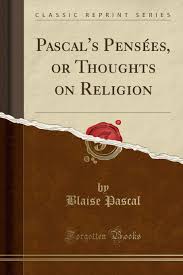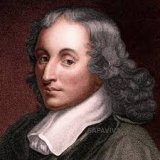Pensées Page #23
The Pensées is a collection of fragments on theology and philosophy written by 17th-century philosopher and mathematician Blaise Pascal. Pascal's religious conversion led him into a life of asceticism, and the Pensées was in many ways his life's work. The Pensées represented Pascal's defense of the Christian religion.
205 When I consider the short duration of my life, swallowed up in the eternity before and after, the little space which I fill, and even can see, engulfed in the infinite immensity of spaces of which I am ignorant, and which know me not, I am frightened, and am astonished at being here rather than there; for there is no reason why here rather than there, why now rather than then. Who has put me here? By whose order and direction have this place and time been allotted to me? Memoria hospitis unius diei prætereuntis.[88] 206 The eternal silence of these infinite spaces frightens me. 207 How many kingdoms know us not! 208 Why is my knowledge limited? Why my stature? Why my life to one hundred years rather than to a thousand? What reason has nature had for giving me such, and for choosing this number rather than another in the infinity of those from which there is no more reason to choose one than another, trying nothing else? 209 Art thou less a slave by being loved and favoured by thy master? Thou art indeed well off, slave. Thy master favours thee; he will soon beat thee. 210 The last act is tragic, however happy all the rest of the play is; at the last a little earth is thrown upon our head, and that is the end for ever. 211 We are fools to depend upon the society of our fellow-men. Wretched as we are, powerless as we are, they will not aid us; we shall die alone. We should therefore act as if we were alone, and in that case should we build fine houses, etc.? We should seek the truth without hesitation; and, if we refuse it, we show that we value the esteem of men more than the search for truth. 212 Instability.[89]--It is a horrible thing to feel all that we possess slipping away. 213 Between us and heaven or hell there is only life, which is the frailest thing in the world. 214 Injustice.--That presumption should be joined to meanness is extreme injustice. 215 To fear death without danger, and not in danger, for one must be a man. 216 Sudden death alone is feared; hence confessors stay with lords. 217 An heir finds the title-deeds of his house. Will he say, "Perhaps they are forged?" and neglect to examine them? 218 Dungeon.--I approve of not examining the opinion of Copernicus; but this...! It concerns all our life to know whether the soul be mortal or immortal. 219 It is certain that the mortality or immortality of the soul must make an entire difference to morality. And yet philosophers have constructed their ethics independently of this: they discuss to pass an hour. Plato, to incline to Christianity. 220 The fallacy of philosophers who have not discussed the immortality of the soul. The fallacy of their dilemma in Montaigne. 221 Atheists ought to say what is perfectly evident; now it is not perfectly evident that the soul is material. 222 Atheists.--What reason have they for saying that we cannot rise from the dead? What is more difficult, to be born or to rise again; that what has never been should be, or that what has been should be again? Is it more difficult to come into existence than to return to it? Habit makes the one appear easy to us; want of habit makes the other impossible. A popular way of thinking! Why cannot a virgin bear a child? Does a hen not lay eggs without a cock? What distinguishes these outwardly from others? And who has told us that the hen may not form the germ as well as the cock? 223 What have they to say against the resurrection, and against the child-bearing of the Virgin? Which is the more difficult, to produce a man or an animal, or to reproduce it? And if they had never seen any species of animals, could they have conjectured whether they were produced without connection with each other? 224 How I hate these follies of not believing in the Eucharist, etc.! If the Gospel be true, if Jesus Christ be God, what difficulty is there? 225 Atheism shows strength of mind, but only to a certain degree. 226 Infidels, who profess to follow reason, ought to be exceedingly strong in reason. What say they then? "Do we not see," say they, "that the brutes live and die like men, and Turks like Christians? They have their ceremonies, their prophets, their doctors, their saints, their monks, like us," etc. (Is this contrary to Scripture? Does it not say all this?) If you care but little to know the truth, here is enough of it to leave you in repose. But if you desire with all your heart to know it, it is not enough; look at it in detail. This would be sufficient for a question in philosophy; but not here, where it concerns your all. And yet, after a trifling reflection of this kind, we go to amuse ourselves, etc. Let us inquire of this same religion whether it does not give a reason for this obscurity; perhaps it will teach it to us. 227 Order by dialogues.--What ought I to do? I see only darkness everywhere. Shall I believe I am nothing? Shall I believe I am God? "All things change and succeed each other." You are mistaken; there is ... 228 Objection of atheists: "But we have no light." 229 This is what I see and what troubles me. I look on all sides, and I see only darkness everywhere. Nature presents to me nothing which is not matter of doubt and concern. If I saw nothing there which revealed a Divinity, I would come to a negative conclusion; if I saw everywhere the signs of a Creator, I would remain peacefully in faith. But, seeing too much to deny and too little to be sure, I am in a state to be pitied; wherefore I have a hundred time wished that if a God maintains nature, she should testify to Him unequivocally, and that, if the signs she gives are deceptive, she should suppress them altogether; that she should say everything or nothing, that I might see which cause I ought to follow. Whereas in my present state, ignorant of what I am or of what I ought to do, I know neither my condition nor my duty. My heart inclines wholly to know where is the true good, in order to follow it; nothing would be too dear to me for eternity. I envy those whom I see living in the faith with such carelessness, and who make such a bad use of a gift of which it seems to me I would make such a different use. 230 It is incomprehensible that God should exist, and it is incomprehensible that He should not exist; that the soul should be joined to the body, and that we should have no soul; that the world should be created, and that it should not be created, etc.; that original sin should be, and that it should not be. 231 Do you believe it to be impossible that God is infinite, without parts?--Yes. I wish therefore to show you an infinite and indivisible thing. It is a point moving everywhere with an infinite velocity; for it is one in all places, and is all totality in every place. Let this effect of nature, which previously seemed to you impossible, make you know that there may be others of which you are still ignorant. Do not draw this conclusion from your experiment, that there remains nothing for you to know; but rather that there remains an infinity for you to know.
Translation
Translate and read this book in other languages:
Select another language:
- - Select -
- 简体中文 (Chinese - Simplified)
- 繁體中文 (Chinese - Traditional)
- Español (Spanish)
- Esperanto (Esperanto)
- 日本語 (Japanese)
- Português (Portuguese)
- Deutsch (German)
- العربية (Arabic)
- Français (French)
- Русский (Russian)
- ಕನ್ನಡ (Kannada)
- 한국어 (Korean)
- עברית (Hebrew)
- Gaeilge (Irish)
- Українська (Ukrainian)
- اردو (Urdu)
- Magyar (Hungarian)
- मानक हिन्दी (Hindi)
- Indonesia (Indonesian)
- Italiano (Italian)
- தமிழ் (Tamil)
- Türkçe (Turkish)
- తెలుగు (Telugu)
- ภาษาไทย (Thai)
- Tiếng Việt (Vietnamese)
- Čeština (Czech)
- Polski (Polish)
- Bahasa Indonesia (Indonesian)
- Românește (Romanian)
- Nederlands (Dutch)
- Ελληνικά (Greek)
- Latinum (Latin)
- Svenska (Swedish)
- Dansk (Danish)
- Suomi (Finnish)
- فارسی (Persian)
- ייִדיש (Yiddish)
- հայերեն (Armenian)
- Norsk (Norwegian)
- English (English)
Citation
Use the citation below to add this book to your bibliography:
Style:MLAChicagoAPA
"Pensées Books." Literature.com. STANDS4 LLC, 2024. Web. 26 Nov. 2024. <https://www.literature.com/book/pens%C3%A9es_114>.




Discuss this Pensées book with the community:
Report Comment
We're doing our best to make sure our content is useful, accurate and safe.
If by any chance you spot an inappropriate comment while navigating through our website please use this form to let us know, and we'll take care of it shortly.
Attachment
You need to be logged in to favorite.
Log In